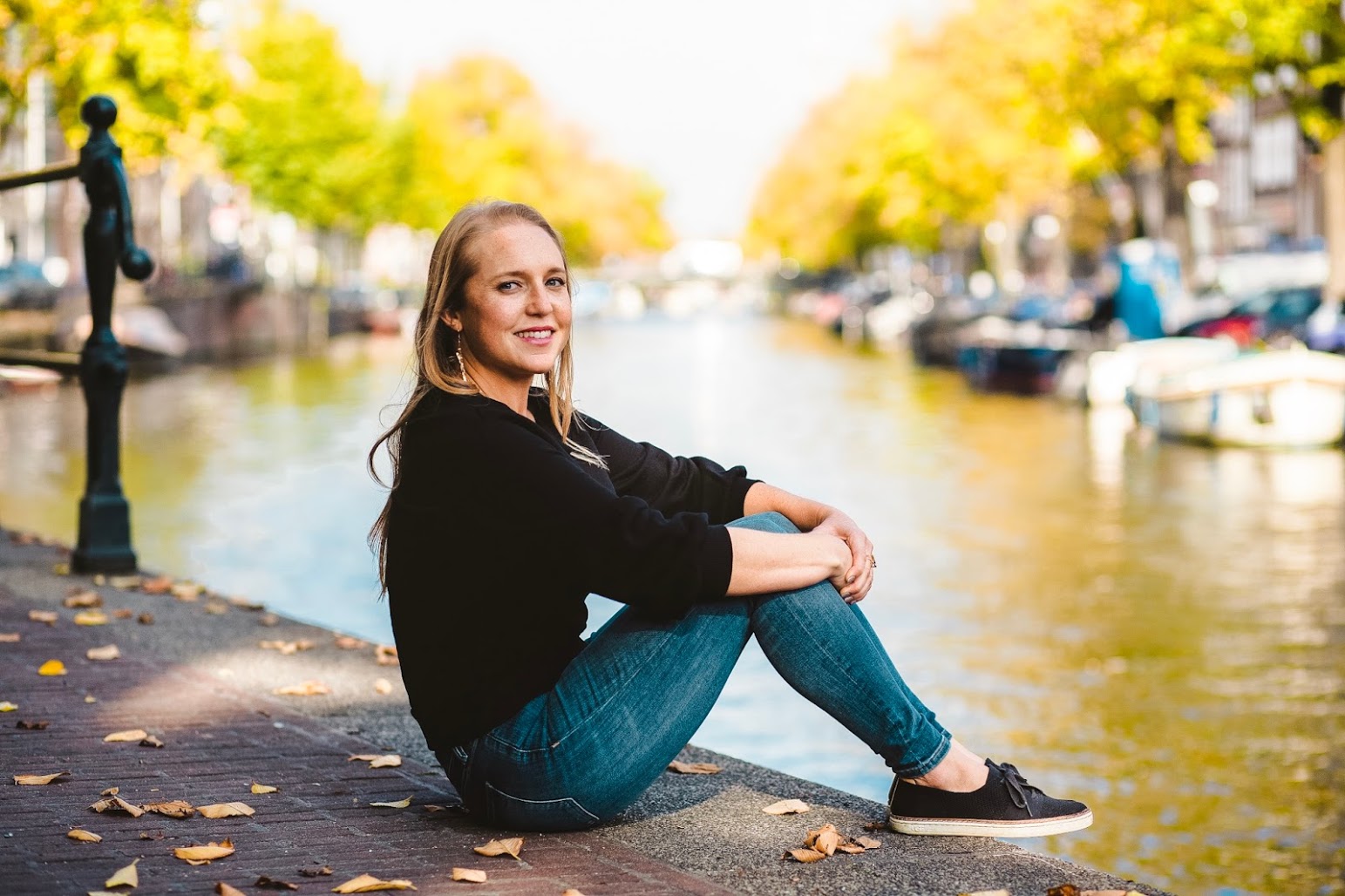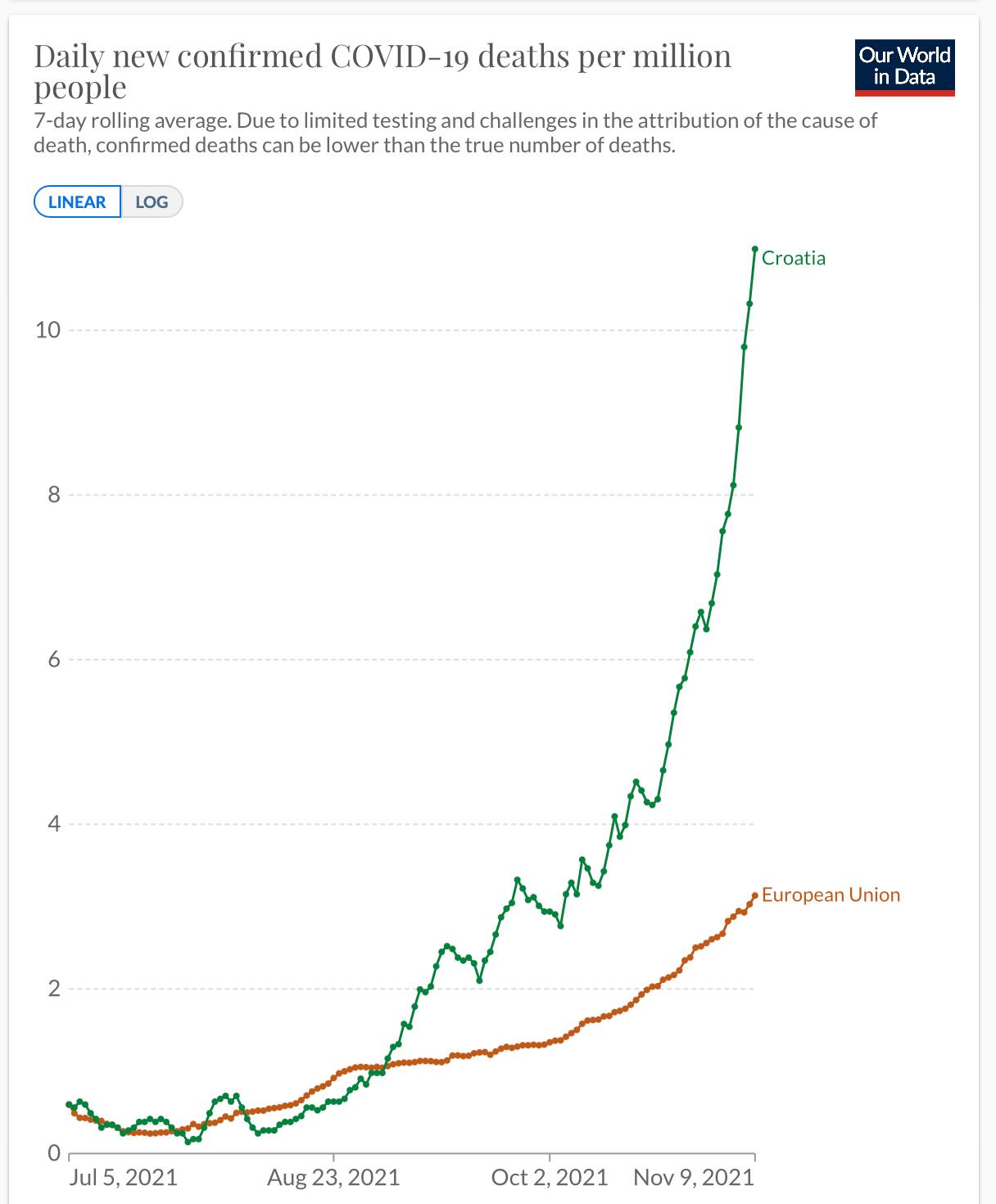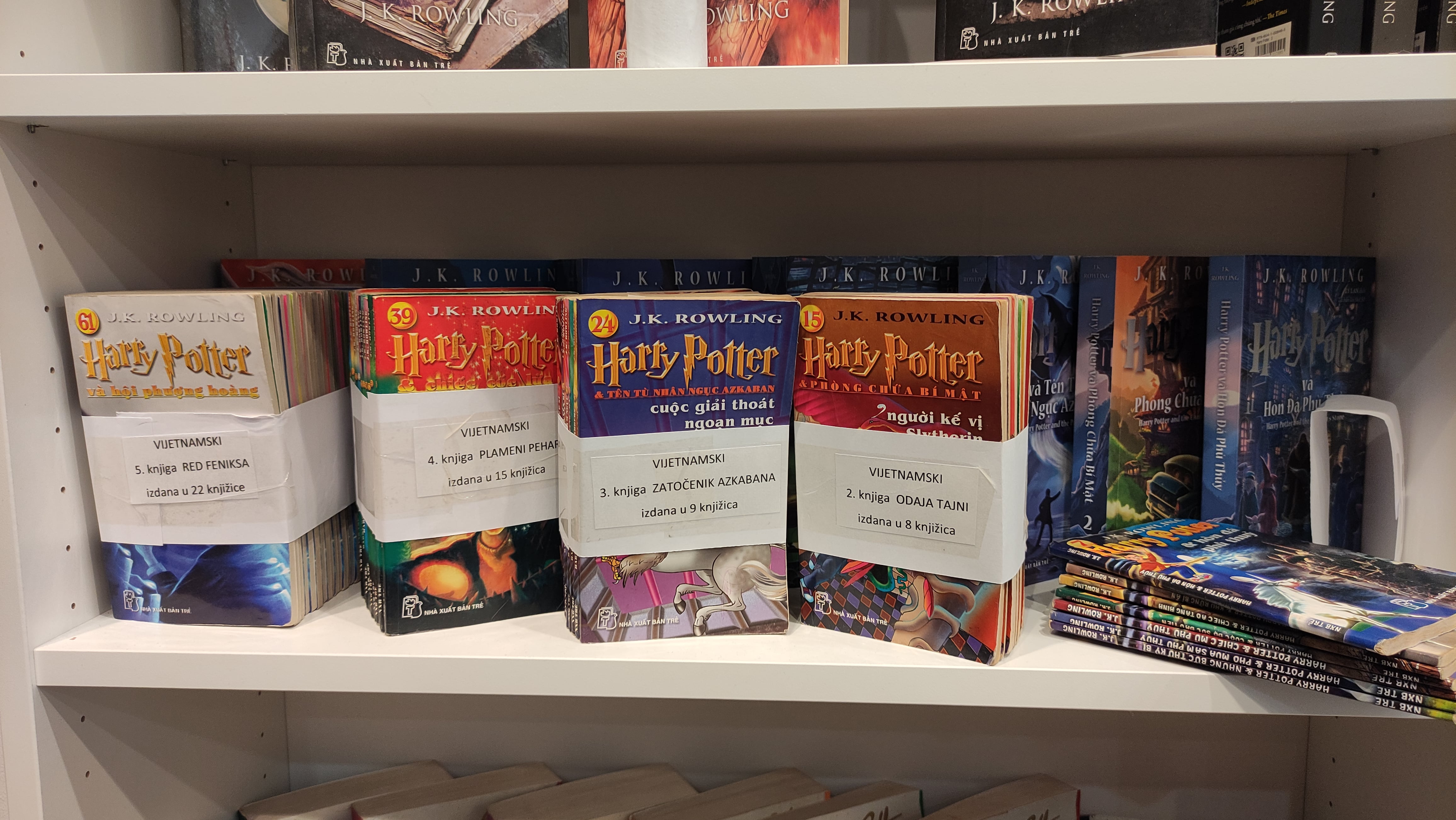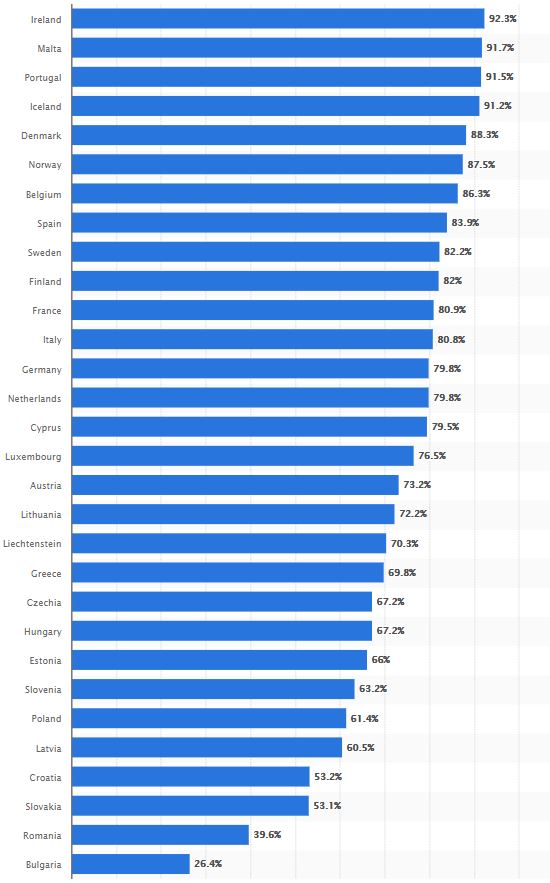Meet the Digital Nomad Week Speakers: Kristin Wilson, Traveling with Kristin
November 10, 2021 - Less than a month until Digital Nomad Week, the virtual edition with 10,000 nomads expected to attend, and more than 100 speakers including TCN. Continuing our look at the keynote speakers, meet one of the most experienced nomads on out there, Kristin Wilson of Traveling with Kristin.
Kristin Wilson is a long-term digital nomad and relocation expert who has been traveling the world for 20 years and helping others do the same since 2005. Today, she's also known as YouTube's Traveling with Kristin and is the host of the top-rated Badass Digital Nomads podcast, with listeners in 156 countries. Kristin is a Top Writer on Medium and Quora in topics such as Business, Life, Travel, Technology, Productivity, and Digital Nomads. She has been featured on The Today Show, HGTV's House Hunters International, Bloomberg Businessweek, The New York Times, Wall Street Journal, Huffington Post, and more. When she's not traipsing the globe or helping people move overseas, you can find her behind the DJ decks.

1. You are a keynote speaker at Digital Nomad Week in December. Tell us a little about DNW, why you decided to get involved, and what you will be talking about.
Digital Nomad Week is an online summit bringing together thousands of people from around the world to learn more about how to work remotely and travel full-time. It was founded by Olumide Gbenro, who is a highly active creator and maker in the digital nomad community.
I decided to get involved with DNW for the same reasons that I decided to start speaking publicly about the location-independent lifestyle to begin with - to share it with others and help people learn from my experiences.
When I started Traveling with Kristin in 2018, there were many misconceptions about remote work. Most companies were too resistant to change and said it wouldn’t work for them. And the digital nomad lifestyle certainly wasn’t taken seriously by the mainstream (Tim Ferriss’ The 4-Hour Work Week book being an exception).
But after living as some form of an expat or digital nomad for 15 years and running a fully-remote, global relocation company for nearly 10 years, I knew what was possible because I’d lived it and helped 1,000 of my clients do the same.
I wanted to share with the masses how they could break free from the conventional, 9-5 rat race and live life on their own terms. And I wanted to portray how attainable this lifestyle really was, and that it wasn’t “too good to be true.” I also wanted to share my mistakes, lessons I’d learned along the way, and things I wish I knew when I started out living abroad.
So, I started getting as involved as I could in the digital nomad community, speaking and hosting workshops on the Nomad Cruise and at the Nomad Summit. I launched two YouTube channels, a digital nomad news show and podcast, and began blogging about every topic or FAQ I could answer. I also started an interview-style podcast, Badass Digital Nomads, in order to host fellow nomads and share their stories of how they transitioned into a freedom lifestyle.
At first, I saw myself as a remote work advocate of sorts, writing about the benefits of remote and work-from-home //medium.com/@kristinmwilson">on Medium and talking about it on my podcasts. But once the pandemic hit, I felt my work there was done. People and companies didn’t need convincing anymore because they saw and experienced the reality for themselves.
Since then, I’ve felt it was more important to serve individual people in helping them transition to location independence and continue spreading the word about the reality of the lifestyle by collaborating with other people in the community. That’s why I wanted to be a part of Digital Nomad Week - it’s full of very experienced speakers who want to help others and grow the movement.

2. How does DNW rate on the nomad conference/festival calendar in your opinion in terms of size/importance?
It’s funny you ask, because before the pandemic started, my team and I spent hours looking up every digital nomad event on the internet and adding it to a free shared Google Calendar. Unfortunately, the lockdowns started a few days later. Most events have since transformed into online summits, and it seems that DNW is gearing up to be one of the biggest in its first year. However, I’m hoping that we’ll have many more in-person events to attend in 2022 and beyond.

3. You have been a digital nomad for over 15 years now. What was it like being a nomad back then compared to now?
There are many more benefits for new digital nomads of today. First and foremost, because of the advances in technology. I can remember when the first iPhone came out in 2007-2008 while I was living in Nicaragua. I was ecstatic because I realized I didn’t have to get so lost anymore while driving through Central America (although the maps features didn’t work so well back then). It’s mind-boggling how many more tools and apps we have at our disposal today compared to 15-20 years ago.
When I first moved to Costa Rica in 2002, I had to use paper scratch-off calling cards at public pay phones to call home and internet cafés to check email. There was no remote learning when I lived in Australia in 2003, for example. And when I moved back to Costa Rica full-time in 2005, we had a 128kbps satellite internet connection at our office that barely loaded Skype. I didn’t have internet at my house until 2010 (just imagine). I feel like I missed an entire decade of pop culture and viral YouTube videos while I was living in the jungle (lol). Technology has really made anything possible these days. But it’s not just FaceTime, social media, and Zoom - it’s many of the products, apps, and services that digital nomads have created to serve our own needs, from co-living houses to retreat groups to sites like NomadList - it’s been amazing to see thousands of digital nomads inventing the things they want to have in the world.
The other huge benefit now is the community aspect. In the “old days,” there was no terminology to describe the lifestyle we were living. There were probably hundreds of thousands of digital nomads who didn’t know what we were and didn’t have any association or connection with each other. Today, we have plenty of in-person and online events, Facebook groups, Slack and Discord channels, private members communities and more for support.
Another massive shift has been in the fintech industry. Before Bitcoin and money transfer services like Wise (TransferWise) were invented, banking options were so limited, restricted, and expensive. It could take weeks or months to open a bank account abroad and then doing business was a nightmare with wire transfers and paperwork.
We also have the digital nomad visas now, of course, which was unheard of before the pandemic. Things are only going to get better for nomads in the future in my opinion. Whereas before, each of us likely felt quite isolated from the mainstream, now we are accepted as a group, we are part of a really cool community of like-minded people, and we have more strength in numbers.
I could go on, but basically everything that was hard before is easier and more convenient today. Even housing - it was so hard to find short-term, furnished monthly rentals before. Now we have Airbnb and thousands of competitor sites.
All of this adds up to a better quality of life for everyone with less time spent on logistics and planning and more time spent on connections and experiences.

4. The pandemic put an increased focus on the potential of remote work, but the trend has been building for some time. Where do you think all this will be in 5 years?
Remote work/work-from-home/telecommuting has been possible for at least 50 years. The only hurdles to mass-adoption were psychological. In that sense, I think that the final barriers to remote work have finally fallen. I wrote an article on Medium in 2019 about “12 Ways the World Will Change When Everyone Works Remotely.” We are already seeing a lot of that but we’ll continue to see the world get smaller. Borders will open up more, travel will become more affordable, and companies will pretty much abandon their hopes for hybrid work. As soon as commercial leases run out, they won’t be renewed unless it’s for flexible workspaces.
Like the venture capitalist, Naval, has talked about on his podcast, more people will become self-employed. Creative, knowledge work will become more valuable as more jobs are automated. We are well on our way to being autonomous, financially independent individuals in a collaborative, global community. We will likely have a global passport, global remote work permit, and global tax system as well.
I made a video explaining what’s behind The Great Resignation recently, as well - see below.
5. I would like to ask you about Croatia, as that is my primary focus. You did a piece on the Croatian DN permit a year ago. How long has Croatia been on the nomad radar, and do you think the perception of and interest in Croatia has changed in the last 12 months. And if yes, in what way?
Croatia really came under the digital nomad radar thanks to the digital nomad visa and a more flexible international travel policy during the pandemic. It has also come onto the digital nomad map by intentional, targeted efforts by Croatia-based nomads to create buzz about it, communicate the benefits for remote workers, and build a community there. Although I traveled to Croatia for fun (and worked remotely there) in 2017, I didn’t hear much about it as a digital nomad destination or meet any fellow nomads there prior to the pandemic.
But it makes sense that so many people are flocking to Croatia now, because of all the attributes the country has to offer. It’s friendly, safe, has a low to moderate cost of living, good weather, fun things to do, food, history, culture, and has a central location between Europe/Africa and the Middle East. The infrastructure and connectivity is also good there, and it’s a bonus for some international citizens that Croatia is still outside of the Schengen Zone, which allows them to stay in the region longer without a visa or permit.
But I think the primary reason that people are attracted to Croatia is because of the efforts by the government and digital nomad association to provide support to new arrivals and make them feel at home. Community is more important than a list of amenities or a pros and cons list, in my opinion.

6. Tell us about your DN experience in Croatia. What was good, and what does Croatia need to focus on to improve?
I spent most of my digital nomad experience in Croatia on a sailboat, so it was an amazing experience sailing the coast and traveling to so many different islands, historical sites, and coastal towns. On the downside, I remember the internet was spotty and I kept running out of data on my sim cards. It was probably for the best as I ended up having more fun and working less, but I would imagine that connectivity has improved drastically in the past 4-5 years.
Editor's note - things HAVE improved a lot in the last few years. Check out last summer's Digital Nomad Sailing Week with 45 Degrees Sailing above.
I wasn’t aware of any digital nomad infrastructure or support system when I was there, or I would’ve used it. So I felt like I was fending for myself at that time and winging it, as other travelers can relate to. I flew over from Italy and left by car and bus on a road trip through the Balkans, so it was an adventure.
I have managed a lot of relocations for clients moving to Croatia, and one of the biggest challenges has been finding affordable long-term housing. Croatia’s economy is very tourism-centric and there is a lot of luxury tourism, so it would be helpful for nomads to have assistance in finding affordable housing year-round.

7. You are installed as the Croatian Minister of Tourism. What are the next steps you would implement to develop Croatia's DN strategy?
I would make the digital nomad visa more flexible and easy to apply for, especially considering that every country in the world will soon have some form of a digital nomad visa.
I think that overall, countries are being too conservative with their digital nomad visa options and not providing enough value or services with it. Governments should make it as easy as possible for remote workers to apply for a long-stay visa in their countries, where they will boost the economy and add to the diversity of the population without taking away local jobs. Give nomads access to the same services as long-term residents and work-permit holders, whether that’s banking, healthcare, etc. Nomads can provide a new kind of stability for the economy, filling a gap between locals and tourists. But there are still many people around the world who don’t understand that they would qualify for a digital nomad or remote work visa, so money should be invested into educating the market.
As Minister of Tourism, I would also look into providing remote work incentives to international citizens, similar to the state and local government initiatives across the US. With all the funds that go into incentivizing companies to create jobs in certain areas, those funds can be re-routed to incentivize individual freelancers, entrepreneurs, and remote employees.
Tourism Boards should also redirect a portion of funds that would traditionally go towards travel agencies, cruise ships, airlines, lobbying groups, and other travel providers and invest instead in learning about and promoting remote work initiatives.
Ideas for how these funds could best be used would come ideally from within the digital nomad/remote work community itself. I would put together focus groups or a task force made up of remote founders/ceos, online entrepreneurs, influencers, co-working/co-living operators, retreat and events organizers, and community leaders to brainstorm and collaborate.
Also, I would share about new initiatives more on social media! (Government websites are notoriously hard to navigate.) But Croatia has been doing a better job than most countries on this, especially buoyed by local news media and DN organizations.
In sum, for countries to thrive in the remote economy, their political leaders must think differently than ever before. This is uncharted territory, but it’s an exciting time in human history. Croatia can help lead the way for other countries to follow.

You can follow Kristin Wilson on her official website, and I also recommend you check out her YouTube channel.
To get your ticket for Digital Nomad Week, check out the event website.
For more news and features about digital nomads in Croatia, follow the dedicated TCN section.
Zagreb International Airport Involved in EU Environmental Project
November the 11th, 2021 - Zagreb International Airport is involved in a praiseworthy European Union (EU) project with its primary focus placed on the environment and the promotion of ''greener'' airports.
We're constantly hearing about our carbon footprint and being urged to try to reduce it. With air traffic and the flight industry in general being a huge issue when it comes to trying to reduce damage, it's often difficult to know precisely what it is we can do to improve things. Zagreb International Airport will no doubt have some of its own ideas.
As Poslovni Dnevnik/Darko Bicak writes, the European Commission (EC) has approved a new project to reduce the harmful impact of the aviation industry on the environment called OLGA - Holistic Green Airport, which includes four international airports and their local stakeholders: Paris-Charles de Gaulle (France), Milano Malpensa (Italy), Zagreb International Airport and Cluj (Romania).
The project is based on an integrated approach and was first started on the 1st of October 2021. It will work to further develop innovative sustainable measures to reduce harmful emissions caused by these airport, all while additionally working hard to improve energy efficiency, air quality, biodiversity and better waste management.
As they point out from Zagreb International Airport, where the project is now being implemented, these solutions support the European Union's general efforts to achieve carbon neutrality and their aim to improve the quality of life.
With a budget of 34 million euros, of which 25 million will be provided by the European Commission over a period of sixty months, OLGA project partners will seek to find solutions to significantly reduce the harmful impact of the aviation sector as a whole on the surrounding environment.
The OLGA project brings together 57 partners and related entities that make up a diverse consortium ranging from large and small airports, airlines and the aviation industry, to public authorities, researchers and innovative SMEs.
For more, make sure to check out our dedicated lifestyle and travel sections.
State Selling Share in Ston Saltworks Which Has Been Operating Since 14th Century
November the 11th, 2021 - The Croatian state is set to sell its share in the famous Ston saltworks (Solana Ston), which has been in operation since way back in the fourteenth century.
As Poslovni Dnevnik/Marija Brnic writes, there are ten more participants in the entire ownership structure of the well known Ston saltworks next to the Croatian state, and the Centre for Restructuring and Sales (CERP) will soon announce the sale of its ownership stake.
The decision of the Governing Board, chaired by the Minister of Physical Planning, Construction and State Property, Darko Horvat, set the starting price at a public tender of up to 1.4 million kuna for the state's share of 9.14 percent, which is equal to three and a half times the amount of the nominal value of that share.
In the overall ownership structure of the Ston saltworks, in addition to the Croatian state, there other participants (the number of which is mentioned above) including the director, Svetan Pejic. The oldest Croatian saltworks, built during the time of the Dubrovnik Republic, formerly a state of its own, has unfortunately been operating at a loss for years. It ended pandemic-dominated 2020 with almost three million kuna in losses, and the transferred losses amounted to a concerning 37 million kuna in total.
The company had revenues of 1.5 million kuna and they were more than halved compared to a few years earlier. The director explained in the financial report that the coronavirus pandemic also contributed significantly to the Ston saltworks' overall decline. It otherwise eight full-time employees, and unlike before, it had no export revenues to speak of.
The value of the Ston saltworks lies in its approximately 50 pools for salt production, but part of it is covered with asphalt that needs to be removed for the production of ecologically clean salt for the type of food for which the saltworks is best known, and it is a condition for resolving property relations which are ongoing.
The sale of the state's share will go through a public auction, which will be 45 days after CERP announces the tender.
For more, check out our dedicated business section.
EU Drug Production Return Chance for Croatian Pharmaceutical Industry
November the 11th, 2021 - The Croatian pharmaceutical industry, which saw a boom in pandemic-dominated 2020 for obvious reasons, could have a huge opportunity on its doorstep if it decides to move quickly and take it as production returns to the European Union (EU).
As Poslovni Dnevnik/Marija Crnjak writes, the strategic turn of the European Union towards strengthening supply chains and maintaining production and investment in Europe provides a window of opportunity for Croatia. To be more specific, over the coming years, the Croatian pharmaceutical industry could use the bloc's move as potential for its own growth and the further development of exports.
At the same time, a significant increase in production in the segment of biosimilar drugs can be expected, in order to increase the availability of drugs for oncology patients.
Unfortunately, this will be a necessary need because after the coronavirus pandemic, a significant increase in oncological diseases (cancer/carcinoma) is expected here in Croatia, as well as across the rest of Europe, due to reduced healthcare facilities being offered in these difficult pandemic conditions, including preventive examinations. This is evidenced by the figures presented on Tuesday by the Association of Drug Manufacturers of the Croatian Employers' Association (HUP UPL).
"In the EU, as many as 73 percent of patients have difficulty accessing healthcare, and the European Cancer Organisation estimates that 100 million early cancer screenings were not performed across Europe during the coronavirus pandemic, and that almost a million cases of cancer ended up not being diagnosed. Here in Croatia, during the pandemic, 41 percent of residents had what they needed for their healthcare agreed upon, and only 16.5 percent managed to realise what they required. The Croatian pharmaceutical industry recorded a drop in the consumption of basic cytostatics by an average of 20 percent, PharmaS had a drop of 30 percent, and this is the first line of treatment for malignant diseases. The consumption of drugs related to anesthesia and surgery has also dropped. This means that both diagnostics and treatment have been reduced,'' said Jerko Jaksic, President of the Management Board of PharmaS and President of UPL.
However, throughout the global pandemic, medicines have been made much more available to patients across Croatia than in other EU countries, and the Croatian pharmaceutical industry has proven to be very resilient indeed.
Croatia is one of the few countries that has all of the segments of pharmaceutical production, from research and development, through the production of active pharmaceutical ingredients to finished products, available to it. Yesterday, for the first time, HUP revealed data showing the sheer strength of the Croatian pharmaceutical industry, which has been declared to be strategic for the Republic of Croatia.
Last year, the sector had a total revenue of 7.42 billion kuna, which is about 61 percent more than it enjoyed 10 years ago, with a constant growth of gross profit that is regularly reinvested - in 10 years, about 5.5 billion kuna was invested. The share of exports in revenues stands at 73 percent and exports are the key to revenue growth. Over the last 11 years, the number of employees in this sector has also quite dramatically increased from 3,500 to almost 6,000.
The Croatian pharmaceutical industry has thus proved to be very resilient and during the pandemic, we were in the lucky position of others being able to seek drugs from Croatia that are otherwise not available on the European market. All of this facilitates a solid negotiating position in the coming period and opens up the potential for investment in new factories and plants.
Namely, surveys conducted in some EU member states have shown that as many as 84 percent of patients want their governments to support investment in drug production so as not to depend on suppliers from China and India. As this is a highly regulated industry, this process will take at least 5 years. The opportunity for growth here in Croatia is the growing share of generic therapy, but also biosimilar drugs. According to data from back in 2019, generic medicines account for 61 percent of total drug consumption in Croatia, which is lower than the EU average of 67 percent.
Of the total consumption of biologics, biosimilars accounted for a modest 13 percent of the market (11 percent in 2018), in contrast to Scandinavian countries where that share is about 70 percent. There is a huge space for growth, but also savings in the health budget with the overall better availability of treatment.
"Regulation is insufficient in some parts, but most often the situation is just that it isn't being implemented, so we still have slow approval times and the prescribing of generic drugs, and despite the fact that the budget for drugs is mostly broken by expensive biological drugs, which are given only in later stages of treatment, we have a low market share of cheaper biosimiles. This is happening because we aren't actually monitoring the outcomes of treatment ", they warned from the aforementioned Association.
For more, make sure to check out our dedicated business section.
2020 Golden Kuna Awards go to HS Produkt, Gamepires, GT Trade, PBZ...
November the 11th, 2021 - The Croatian Chamber of Commerce (HGK) has awarded its 2020 Golden Kuna awards (Zlatna kuna) to numerous Croatian companies which have experienced success and aided the domestic economy during the unprecedented and extremely challenging coronavirus-dominated year of 2020.
As Poslovni Dnevnik/Suzana Varosanec writes, the Croatian Chamber of Commerce's 2020 Golden Kuna awards were awarded recently for the 25th time, at a ceremony which could only be attended by those possessing covid certificates at Zagreb's Westin hotel. The winners are in eight categories - for small, medium and large companies, the most successful bank and insurance company, for innovation, for responsible and sustainable business and for what's known as ''life's work''.
Dok-Ing is rather unsurprisingly the winner of the 2020 Golden Kuna for innovation, PBZ (Privredna banka Zagreb) has been proclaimed the best Croatian bank of last year, and Croatia osiguranje (insurance) has been declared the best insurance company of 2020.
When it comes to being awarded for responsible and sustainable business, Jadran - Galenic Laboratory took home the 2020 Golden Kuna award. Zagreb's Gamepires won the same in the small business category, G.T. Trade from Split won in terms of the best medium-sized company, while HS Produkt from Karlovac won as the best large company. Special awards and recognitions were also presented along with the 2020 Golden Kuna awards.
The Croatian Employment Service (CES) has won an award for its efficiency in implementing government economic measures to preserve jobs due to the pandemic which were readily introduced last year. Dragutin Kamenski, the owner of the construction company Kamgrad, received the 2020 Golden Kuna for his life's work. The Croatian Chamber of Commerrce also presents the Golden Kuna awards for business success and contribution to the domestic economy.
The list of nominations is based on the calculation of established indicators, and the business image of domestic companies, the impact on the development of the activity to which they belong and the contribution to the development of the Croatian economy as a whole are adequately evaluated.
For more, make sure to check out our dedicated business section.
Croatia Cannot Vaccinate its Own But is King of Russian Vaccine Tourism
November 10, 2021 - As Croatia experiences record COVID-19 cases, an unlikely late-season hit - Russian vaccine tourism.
Imagine the following:
A tourism country embarks on a major campaign under the slogan, Stay Safe in Destination.
The shiny campaign looked very nice, but there were a couple of flaws in the campaign.
Firstly, the measures - such as they were - were openly flouted in many areas, with visitors arriving expressing surprise at just how relaxed things were.
And one might have thought that a high vaccination rate would have been a pre-requisite for a Stay Safe campaign to attract people, but not in this Kingdom, where vaccination rates were the 4th lowest in the EU.
Share of adults who are fully vaccinated against COVID-19 in the European Economic Area (EEA) as of November 4, 2021, by country. - Source Statistica
And yes, vaccination rates were a factor which played a part in the decision on where to travel, confirmed the nice lady expert from Expedia when I asked her at the Q&A session at the recent Days of Croatian Self-Congratulation in Dubrovacka Zupa last month.
Now imagine the destination suddenly sees a rapid rise in cases, far above the EU average.
Far above.

With such alarming numbers, some countries might veer towards a strategy of lockdown or similar. But none would have come up with the genius of this destination.
In a country where it can not vaccinate its own citizens, and with record numbers of new cases hardly being a top tourism draw, a new kind of tourism is launched - Russian vaccine tourism! Fly in to Croatia for your free EU-compliant vaccine.
As Euractiv reports - Croatia now most popular vaccine tourism destination among Russians.
Simple Flying has more details on the packages available:
"Russian Express, a tour agency, is selling four-day trips to Croatia for vaccine tourism at the cost of 439 euros ($510). The tours have been running since September, and they are increasingly popular, Večernji reports.
"Croatia offers free vaccinations to foreigners. Russian citizens are getting vaccinated in walk-in vaccine centers in the cities of Zagreb and Pula with no appointment required."
Quite brilliant.
Meet the Digital Nomad Week Speakers: Lily Bruns, Draper Startup House
November 10, 2021 - Less than a month until Digital Nomad Week, the virtual edition with 10,000 nomads expected to attend, and more than 100 speakers including TCN. Continuing our look at the keynote speakers, meet community builder Lily Bruns of Draper Startup House.
Lily is an international community builder and content marketer who helps startups tell their story. She is the Country Manager for Thailand at Draper Startup House and she's an avid advocate for digital nomad visas.
1. You are a keynote speaker at Digital Nomad Week in December. Tell us a little about DNW, why you decided to get involved, and what you will be talking about.
Olumide and I have known each other for a while due to our mutual interest in advocating for digital nomad visas. He knew me as a community connector thanks to my work with Draper Startup House, hosting Clubhouse communities, and he was on my panel at the Work + Travel Summit. When he asked if I would like to lend a hand with Nomad Week and help shape its direction, I was thrilled to jump in as an organizer and moderator. Most of my sessions will focus on policy, infrastructure and communities that enable digital nomads.

2. How does DNW rate on the nomad conference/festival calendar in your opinion in terms of size/importance?
Lots of similar events are strongly focused on helping newbie nomads join the movement, and I think DN Week will do a great job of this thanks to the wealth of workshops, but this conference is really a who's who of thought-leaders in the movement. People who don't just live the lifestyle, but are committed to shaping the future of the community, and it's always exciting to feel like you're part of creating something rather than just logging on to learn some new tips and tricks.
Since it's our first year, the jury's still out on what the numbers will be, but I know it's a guaranteed good time because so many of the panels are composed of friends and colleagues having fun and nerding out together. I think audiences appreciate authenticity and will value that more than some of the events that win out on hype and size.

3. The pandemic put an increased focus on the potential of remote work, but the trend has been building for some time. Where do you think all this will be in 5 years?
I never would have believed it pre-pandemic, but I think the dream of a "Nomad Passport" can really become a reality thanks to all the countries getting on board with the trends in global mobility! Before, we dreamed of just one country having a proper visa for digital nomads, but now the idea that we can create a Schengen-esque system where one application gets you entry to a network of remote-work friendly countries seems not just likely, but inevitable - and that's going to be GAME-CHANGING.
4. I would like to ask you about Croatia, as that is my primary focus, and I understand you recently visited Zagreb. Tell us a little about your experience of Zagreb and Croatia as a DN destination.
I really enjoyed Zagreb! I wish I had gotten to spend more time there. I adore European cities for their history, architecture, and walkability. Having previously spent some time in Split, a visit to Zagreb impressed me with Croatia's cultural diversity. There's a lot happening in a relatively small country, and that makes for a fun place to visit. Also, as confusing as it was, I loved that there were so few signs in English and that I was constantly perplexed at what was going on since I didn't know any words besides thank you. In Thailand where I live, because visitors often look different than the locals, you're always spoken to in English. Nobody assumed they ought to speak English to me in Croatia (except at the airport and hostel) which was kind of refreshing.

5. What is the perception of Croatia as a DN destination, and has it changed in the last 12 months? If yes, in what way?
When my, mostly American, friends were scrambling to bunker down somewhere during lockdown last year, I think Mexico and Croatia were basically the two options open to them, so I had a lot of friends pass through. I think this really opened people's eyes to the spectacular country that had been there all along, but was flying under the radar. Thanks to the nomad-friendly policies, I think Croatia has a good chance of attracting these types of visitors for years to come, but there's still not a lot known about the community.
6. You are a community builder. How would you assess the Croatian DN community at the moment. Can you give us a few quick wins to make it stronger?
More coworking spaces please! And places in general that nomads can go to find each other. Coming from Thailand where we have a strong cafe culture and it's very normal to buy a coffee and park with your laptop somewhere for a couple of hours, I was surprised at how hard it was to find places like that in Zagreb. While I noticed plenty of young folks out and about, if it weren't for staying at a Hostel (shoutout to Swanky Mint!) I wouldn't have known where to find my people. The community grows and connects itself when you give it hubs to gather around, so I would really increase the visibility and density of these, and work with local businesses and communities to maintain an active roster of events.
Editor's note: The TCN Guide and Map of Zagreb Co-Working Spaces for future reference.

7. You are installed as the Croatian Minister of Tourism. What are the next steps you would implement to develop Croatia's DN strategy?
Speak to the Ministers of Education and also Science and Technology! Digital nomads represent an attractive target group for tourism, but we're a community truly devoted to giving back. The easier it is for us to integrate, the more we do give back by teaching, training, starting businesses and more. We're entrepreneurs and explorers, and we represent some of the most educated and professionally privileged people on the planet, so we have a lot to give.
We also want to learn and understand the places and cultures we move through, so creating experiences and opportunities outside of the urban areas for digital nomads to immerse themselves should also be prioritized. When you travel a lot, many touristy places start looking the same, and the conveniences and amenities are nice, but you also want to get that sense of place and to dig deeper to make the most out of exploring. To me, it's all about exchanging culture, knowledge, and opportunities, not just spending dollars in exchange for photos and Instagram Likes - you know?
You can learn more about Lily Bruns, as well as connect via her official website.
To get your ticket for Digital Nomad Week, check out the event website.
For more news and features about digital nomads in Croatia, follow the dedicated TCN section.
Harry Potter Around the World: 500 Copies Displayed in Rijeka
Following the exhibition in Zagreb, the impressive collection counting over 500 copies of international editions of the popular book saga is currently on display in Rijeka
How many editions of the Harry Potter series have you ever seen in one place? In an average bookstore, probably 2-3. In better bookstores, or possibly on shelves of avid fans, maybe a few more.
How about 500+ copies in over 60 languages?
You don’t often get an opportunity to see an entire room covered in bookshelves dedicated to a single piece of fiction. That’s exactly what I went to see today: an exhibition of 530 copies of the beloved series and a few related works, currently on display at the Tower Center mall in Rijeka.

The incredible collection is owned by Damir Tonković who graciously made it available to the public, and counts editions in 68 languages acquired all over the world. From English and Croatian to Yiddish and Maori, the scope of the collection reflects the immense popularity and the universal appeal of the Potter saga to audiences spanning generations.
Many books on display, including the first Croatian edition, share the famous cover art created by Mary GrandPré:

Fun fact: the first Croatian edition of the Harry Potter series (shown on the photo above) is somewhat of a rarity these days. Since the infamous crash of the publishing house Algoritam (2017) and the expiration of their exclusive publishing rights for HP in Croatia (2019), this particular edition has not been in print and is pretty hard to acquire, as owners willing to part with their copies are few and far between. Second-hand prices have soared over the last few years: each book in the series, which originally cost €20-25 on average, now easily sells for double or even triple the price. The first few books in the series are hardest to find and go for up to €100 apiece.
Back to the exhibition: I loved seeing different art styles on some of the international editions. The Thai one, for example, with its lavish cover art reminiscent of movie posters:

Unfortunately, I forgot to make a note of the country of origin of what might be my absolute favourite on display:

I also found it interesting to see different approaches to publishing. In Vietnam, each book in the series was published in several smaller parts. For example, The Order of the Phoenix was published as a serial of 22 instalments!

Visitors are allowed to leaf through all the books on display - quite a bold decision on behalf of the organizers, if you ask me, but I picked up a few nonetheless to check out the artwork in the illustrated editions.

And as for the cover photo at the top? I barged in right after they opened today and was lucky to snap a pic of the empty room. It was otherwise much more crowded, especially on weekend mornings when the youngest visitors enjoyed some storytelling, and the Ministry of Magic held creative workshops for kids aged 7-14. It's no surprise that all the workshops and storytelling hours were fully booked days in advance.
The collection will remain on display at the Tower Center mall in Rijeka (3rd floor) until this Sunday, November 14th. It can be visited free of charge, every day from 5PM to 9PM, or from 11AM to 9PM on Saturday and Sunday.
The exhibition in Rijeka was organised by Hoću knjigu in collaboration with the Tower Center. It was first displayed in Zagreb earlier this year, and will make its way to other cities in Croatia as well (to be announced).
Tonči Stipanović Wins World Sailing Bronze in Barcelona!
November 10, 2021 - Croatian sailor Tonči Stipanović won the bronze medal at the ILCA 7 World Championships (formerly Laser), which ended in Barcelona on Wednesday with a lot of difficulties.
Wednesday was meant to be the deciding day with three final races, but three of the total six competition days were unable to go ahead due to unfavorable weather conditions in Barcelona! After towering waves in the morning prevented the fleet from entering the regatta, the rain then began which forced the regatta committee to declare that no one would sail today.
In such conditions, 35-year-old Tonči Stipanović kept the bronze medal, which is the third world medal for the 2x Olympic silver medalist and member of the Split sailing club Mornar. In 2010 he won the silver, and last year he took bronze in Australia.
This is his tenth big medal in Laser in total, and the world bronze came in the same year as the Olympic silver from Tokyo, so Tonči can be proud of his achievements in 2021.
Stipanović's club colleague and current European runner-up Filip Jurišić took 21st place with 126 negative points, and the third Croatian representative Bruno Gaspić finished 48th with 194 negative points.
New Zealander Thomas Saunders is the new world champion, and the silver went to Irishman Finn Lynch.
Source: HRT
To read more about sport in Croatia, follow TCN's dedicated page.
Marić: 2023 Realistic Year for Croatia's Euro Area Entry
ZAGREB, 10 November, 2021 - Finance Minister Zdravko Marić said on Wednesday that 2023 was a realistic year for Croatia to join the euro area, provided that it met the necessary criteria, stressing that the process was proceeding well.
Marić made the statement at a conference of economists in Opatija, speaking online from home where he is isolating after testing positive for COVID-19.
Croatia is meeting the majority of the criteria. It is among the countries in which the public debt to GDP ratio is expected to fall over the next three years, while the ratio is expected to rise in more than half of the EU member states, the finance minister said.
Speaking of the euro changeover process, he said that the views of citizens that the adoption of the common currency might affect the inflation rate and trigger price hikes should not be ignored.
In the countries that introduced the euro last, the adoption of the common currency had a one-off effect on price increases. In the process of euro adoption in Croatia, it is very important to keep people informed of all aspects of this process, he stressed.
To protect consumers, the kuna will be converted at a fixed exchange rate and any costs that may arise will be covered by financial institutions. This will also apply to the conversion of loans, Marić said. Five months before the adoption, prices will be displayed both in kuna and in euro, and after the adoption, it will be possible to pay in kuna for another two weeks, the finance minister explained.
Marić reiterated that the government expected real GDP to reach its pre-pandemic levels by the end of this year. Inflation is expected to flatten out and prices of raw materials, energy and goods are expected to fall, he said.



